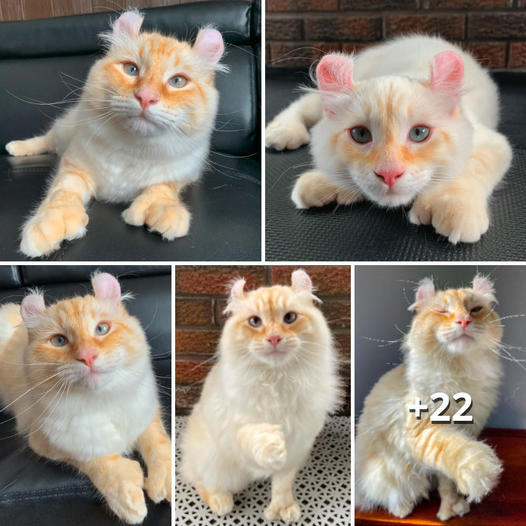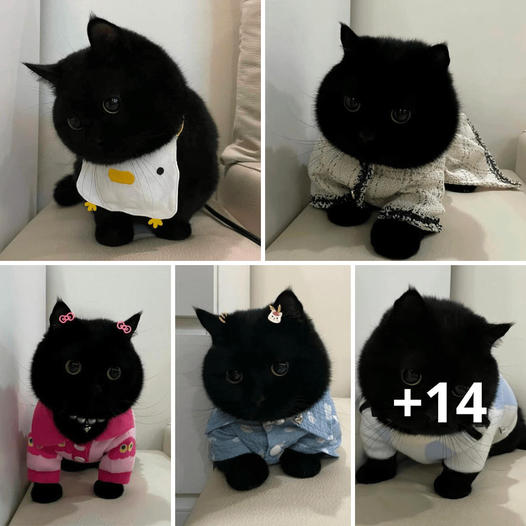The sound of a crying baby echoed through the remains of a school in Raqqa, a city ravaged by war in Syria. It was a desperate plea for assistance that sent chills down our spines. However, as experts in bomb disposal, we were aware of the ruthless tactics employed by ISIS. They often used the cries of innocent children as a ploy to lure unsuspecting victims into their deadly traps. This incident took place in February 2018, just four months after the US-led coalition had freed Raqqa from the clutches of ISIS. Yet, the aftermath of their reign was still evident in the numerous hidden improvised explosive devices (IEDs) scattered across every building and crevice.
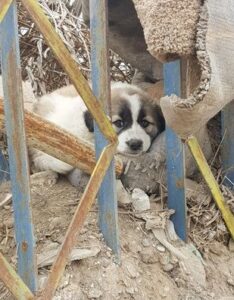
As a former member of the Royal Engineers, I was assigned to a team responsible for neutralizing IEDs. It was towards the end of an exhausting day when we suddenly heard a distressing cry. With caution, we scanned our surroundings for any signs of tripwires or motion detectors. Eventually, we traced the sound to a large concrete pedestal. As we moved it aside, we were surprised to discover not a Syrian child, but a scared and tiny Chihuahua.
This little pup, accompanied by the remains of three other puppies and a much larger dog, who I presumed to be its mother, was the only survivor of a horrifying ordeal. Despite the surrounding chaos, the Chihuahua appeared to be relatively unharmed, although the word “relatively” is key here.
Throughout my years as a soldier, I have witnessed the devastating aftermath of war. Every day, as we ventured into Raqqa, the landscape was a chilling testament to the brutality of conflict. Bullet-riddled homes, mass graves, and the heartbreaking sight of children who tragically lost their lives due to a single misstep.
This trembling puppy, born into the heart of this merciless warzone, serves as a stark reminder of the unforgiving nature of warfare.
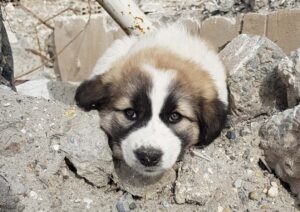
He had a completely white coat, except for his ears which were dark and the patches of black and brown on his small, round head. I noticed a layer of dust hovering on his fur. “I’m scared too,” I reassured him, and I truly meant it. Ever since I was attacked by my neighbor’s aggressive Rhodesian Ridgeback when I was five, I had developed a genuine fear of even the tiniest animal.
To protect myself, I put on extra-thick gloves used for battles, and carefully handed him a biscuit using my medical clamps. After contemplating for a moment, he cautiously took a tiny nibble. As he did, I gently patted him, still ensuring my hands were shielded by gloves meant for the army.
“Who’s a good boy, Barry?” I exclaimed enthusiastically, causing my entire team to burst into laughter. Being a burly man with a full beard and tattoos covering my body, they didn’t anticipate my ability to converse in baby talk. But our time together was short-lived. Our camp was located an hour to the west of Raqqa, and it was time for us to return. I noticed that Barry was still too frightened to be picked up, so I left him with a biscuit and some water before we departed.
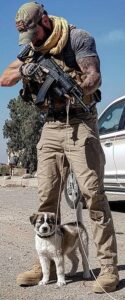
“I’ll see you tomorrow, Barry,” I responded with a deep desire for it to be true, as I was fully aware that Barry was not an ordinary dog.
Encountering Barry had given me a glimmer of hope, the first since my departure from the Army in the summer of 2014 after serving two strenuous tours in Afghanistan over a span of seven years.
Back in Essex, there were moments when I would find myself in tears, reflecting upon the horrors I had witnessed. The memory of the disfigured corpse of a fellow soldier, who had been abducted and mercilessly tortured by the Taliban, haunted my thoughts.
Though I now understand that I was grappling with Post Traumatic Stress Disorder (PTSD), at the time, I felt ill-equipped to handle the daily struggles of civilian life, seemingly bombarded by one challenge after another.
Already attempting to make a living as a personal trainer, life dealt another blow when my girlfriend suffered a miscarriage. The news of her pregnancy had once filled me with immense joy, but her loss plunged me into a deep despair. I turned to heavy drinking, feeling like a ticking time bomb, until our relationship ultimately disintegrated. With nowhere else to go, I reluctantly took refuge in my van, desperate to hide the state I was in from my parents.
The only moments when I felt a semblance of my former self were during the funeral of a friend who had lost his life while clearing IEDs in Syria in October 2017.
In my hometown, I was seen as a failure. Yet, amongst my former comrades, I was known as Sean the soldier.
Embracing that identity, it took little persuasion when I was asked to assume my friend’s role in the Syrian team. It was January 2018 when I arrived, and a month later, I had my first encounter with Barry.
The day after discovering him amidst the rubble of a school, my heart sank as there was no sign of him.
As we prepared to return to base, I reassured myself that everything was fine, convincing myself that I hardly knew him and had other pressing matters to attend to. But my spirits soared when one of the Syrians I worked with shouted, “Barry! Barry! Barry!”
Barry had concealed himself, seeking refuge from the biting cold winds of the night, and must have wondered who this persistent stranger was that wouldn’t leave him alone. I felt like a genuine stalker.
For him to trust me, I had to take a leap of faith in return.
Despite my reservations, disregarding any logical advice, I extended my ungloved hand and affectionately stroked his head. The touch felt right, but it took two more days of such visits for him to become certain enough of me that I could bring him back to our headquarters.
When I cradled him in my arms for the first time, confusion emanated from his gaze, as if questioning my intentions. Yet, as I looked down at him, I knew that he was my son, and I his father. He dozed off loudly during the trip back to base, experiencing a truly peaceful slumber for the first time in his short existence, comforted by the knowledge that I would protect him.
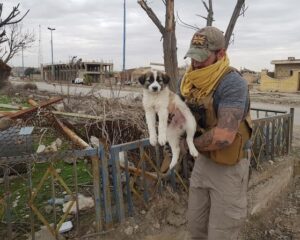
Upon returning to camp, I brought him to my cozy room and gently laid him on my comfortable duvet, allowing him to continue snoozing a while longer. When he finally woke up, I leaned in for a kiss and was taken aback. It was clear that he had never experienced a shower before and had no interest in having one now. I attempted to mimic a shower with a sink and a small shower-like attachment, but his legs contorted in every direction to avoid what he perceived as a dangerous situation. Nevertheless, after the makeshift shower, his fur was incredibly fluffy. It was during this examination for any potential irritations that I made the surprising discovery that my companion, originally named Barry, was actually a female. It was too late to change her name completely, so I simply modified it to Barrie, fixing the issue at hand.
Later that evening, I decided to introduce Barrie to the local pub, where she quickly acquired a group of willing volunteers to be her “other dads.” One such individual was my friend Digger, a rugged Scotsman who hid a sensitive side beneath his rough exterior. In a warm gesture of welcome, he crafted a small teddy bear out of rope and an old pair of pants, along with a collar and a military harness adorned with Barrie’s name.
Digger had previously been involved with a charity called War Paws, which focused on rescuing dogs from Afghanistan. Knowing that I wanted Barrie to accompany me back home, I took it upon myself to create an online fundraising page to gather the £4,500 necessary to bring her to England. To capture attention, I opted for a photo with a military theme. I laid my military vest and weapon on the ground and placed Barrie inside, allowing her head and paws to peak out from the top.
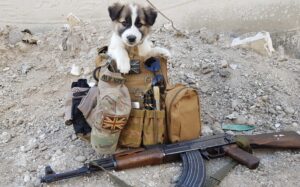
In less than a day, her adorable appearance managed to help us raise nearly £1,000. As we waited for more contributions to come in, she became a regular companion during my work hours.
During our journeys to Raqqa, she would often find comfort by resting her head between the front seats of our SUV, observing the world outside.
Her presence brought solace to everyone, especially during difficult moments like the day we mourned the loss of Mohammed, a brave soldier from the Syrian Defence Force, to an IED. After washing away his blood in the shower block that night, I returned to my room only to find Barrie with one simple desire: to cuddle.
“Today was challenging, Barrie,” I whispered as she lay upside down on her back, paws lifted in a gesture of longing. Holding her small frame in my embrace, I felt a sense of relief as the burdens of the world lifted off my shoulders.
Each morning, she would awaken me by perching herself on my face, and whenever I worked on my paperwork, she would diligently inspect my computer mouse, preparing herself to playfully pounce.
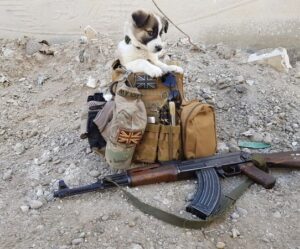
I made an effort to discipline her, but she managed to turn all of us into softies who followed her lead. Even our Malaysian chefs, who prepared a special dish of grilled chicken for her every day, couldn’t resist her charm and would get excited when they saw her approaching.
Barrie had a way of bringing out the youthful joy in people, even intimidating Navy Seals. One day, six massive Navy Seals walked into our office, looking tough and ready for battle. I expected a firm handshake and a serious conversation, but as soon as they laid eyes on Barrie, they couldn’t help but melt. They took turns doting on her and showering her with attention.
Every day was like that with Barrie, as I confided in my friend Netty, who had been my personal training client for three years. We had spent a lot of time together in England, but our bond truly deepened when Barrie entered the picture.
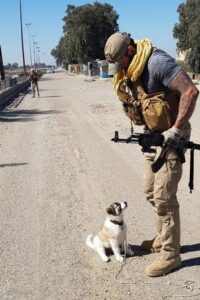
Upon seeing a photograph of herself, Netty quickly decided that she wanted to become her mother. The process of preparing ourselves for parenthood brought us closer and transformed our friendship into a romantic relationship. The anticipation of bringing Barrie home with me filled me with excitement, but soon we encountered a significant obstacle.
During a brief trip back home in March for a wedding, I was preparing to return to Syria when I received the news that our contracts had been canceled due to the escalating insecurity in the country. All my friends were being evacuated and no travel to our previous location was permitted. However, I was determined to bring Barrie out of Syria.
Thankfully, we had already surpassed the £4,500 fundraising goal set by War Paws, an organization that helped us, and they made arrangements for Barrie to be discreetly smuggled into Iraq via a truck. From there, she was placed in quarantine in Jordan, which marked the beginning of the long wait for her homecoming. We were told it would take at least three months, assuming everything went smoothly.
Throughout my attempts to readjust to civilian life, I missed Barrie every day. However, she was the reason I didn’t spiral back into the mess I was a year ago. Being her father motivated me to continue pushing myself as I worked on creating a home that Netty, Barrie, and I could share.
Unfortunately, I couldn’t afford to move out of my parents’ house, and my dad was allergic to pet hair, making it impossible for Barrie to stay there. As a solution, I converted the shed in their backyard into a small cabin, just enough space for the three of us.
Finally, in October of last year, after several delays, we received the long-awaited call informing us that Barrie was being flown to Paris. Netty and I quickly purchased tickets for the Eurotunnel and embarked on a 300-kilometer journey to Charles de Gaulle Airport to meet her.
Upon arriving at the airport, we were greeted by the distant barks of what seemed like a pack of aggressive dogs. I imagined there must have been multiple dogs, but to our surprise, it was only Barrie, confined in a crate and clearly distressed.
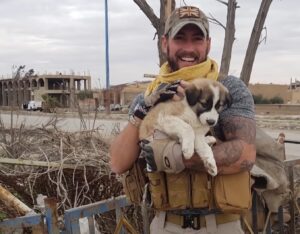
She was no longer the adorable, small dog I had discovered in Syria; instead, she had transformed into a fierce, large dog. However, I understood that her aggression was merely a result of fear. I had hoped that she would recognize me when I approached her cage, offering an old T-shirt infused with my scent from a week of wearing it to bed. Unfortunately, she stared at me as if I was crazy and responded with another round of barking.
“I don’t think she remembers me,” I quietly muttered to Netty. It had been seven months since I had seen her, and now I couldn’t help but feel a sense of sadness.
Nevertheless, as we made our way to our diminutive Nissan Micra, she seemed to grow calmer. Just like in Syria, she had to push her head through the space between the two front seats in order to fit inside. Within moments of setting off, she drifted off to sleep. During a brief stop at a layby hours later, she awoke and began licking my leg. She then playfully slid along the ground, her belly exposed and her paws reaching out towards me.
It was clear that she recognized me. “Who’s a good girl?” I finally asked, filled with anticipation to say those words. After waiting for so long, I had the opportunity to express my love and affection. The next morning, as we settled back into our converted shed, I let her out to attend to her needs. But she quickly returned, jumping up onto the bed, her tail wagging wildly as she nestled herself on my chest.
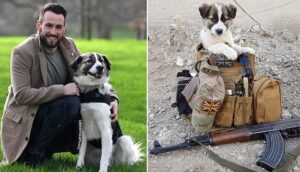
I couldn’t help but smile, even though I struggled to catch my breath as she became heavier. I had hoped to ease her into her new life, but the attention from our fundraising campaign grew exponentially once we were reunited.
Our story made headlines in national newspapers, we made appearances on televised news programs, and we even had a chance to chat with Eamonn Holmes and his wife Ruth on This Morning. However, there was a moment of uncertainty when we almost couldn’t make it to the interview because their studio was on the first floor and Barrie, who had never encountered stairs before, refused to climb them. I had to carry her up.
Barrie now weighed 27 kg, and every step was challenging for me, but I was willing to do anything for her because that tiny, dusty creature I discovered in the rubble has had a profound impact on my life.
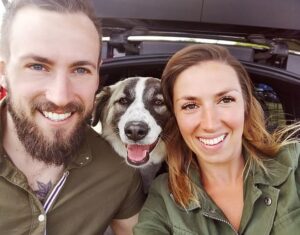
Encountering her was the most extraordinary day in my existence. Were it not for her, I’m uncertain if I would have ever managed to emerge from the depths of despair that consumed me following my time in Afghanistan, confronting the atrocities I witnessed as a soldier, or acquiring the knowledge of how to be a responsible member of society.
At present, I dedicate some of my time to assisting as a paramedic while also co-managing a fitness training venture alongside a companion. While moments of anxiety occasionally creep in, I simply shut my laptop and engage in playful activities with Barrie.
With her presence, I gain a newfound clarity and sense of purpose. It’s commonly believed that I rescued Barrie’s life, but the truth is that she rescued mine.

